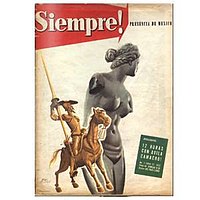Siempre! is a news and political magazine published in Mexico.[1] The magazine is published on a weekly basis.[2] By the end of the 1960s the magazine became a significant part of Mexican politics and an important publication for democratization of the country.[3]
 | |
| Categories | News and political magazine |
|---|---|
| Frequency | Weekly |
| Founder | José Pagés Llergo |
| Founded | 1953 |
| Country | Mexico |
| Language | Spanish |
| Website | www |
| ISSN | 0583-2039 |
History and profile
editSiempre! was established in 1953.[3][4] Its founding editor was José Pagés Llergo.[3][5] The magazine is affiliated with the Popular Socialist Party and has a socialist stance.[4] The political stance of the magazine has been subject to changes over the years.[4] For instance, it first supported Cuban president Fidel Castro, but then it began to criticize him.[4]
Siempre! was known for using photographs in the news,[5] and the best Latin American cartoonists and illustrators of the era often participated in it. Famed Mexican caricaturist Antonio Arias Bernal was its founding art director and a frequent cover contributor in the 1950s. In the 1960s, Jorge Carreño published satirical illustrations in Siempre![3] and Leonardo Vadillo Paulsen contributed cartoons.[6]
In 1969 the claimed circulation of Siempre! was 120,000 copies.[7]
As of 2013, Beatriz Pagés Rebollar, daughter of the founder, was the magazine's current director.[8]
References
edit- ^ "Mexico press". Press Reference. Retrieved 8 August 2015.
- ^ Claire Brewster (April 2002). "The Student Movement of 1968 and the Mexican Press: The Cases of "Excélsior" and "Siempre"!". Bulletin of Latin American Research. 21 (2): 171–190. doi:10.1111/1470-9856.00038. JSTOR 3339451. – via JStor (subscription required)
- ^ a b c d Eric Zolov (2006). "Jorge Carreño's graphic satire and the politics of "presidentialism" in Mexico during the 1960s". E.i.a.l. 17 (1).
- ^ a b c d Michael B. Salwen; Bruce Garrison (2013). Latin American Journalism. New York; London: Routledge. p. 132. ISBN 978-1-136-69133-1.
- ^ a b John Mraz (2009). Looking for Mexico: Modern Visual Culture and National Identity. Durham, NC; London: Duke University Press. p. 156. ISBN 978-0-8223-9220-0.
- ^ Richard R. Fagen; William S. Tuohy (1972). Politics and Privilege in a Mexican City. Stanford, CA: Stanford University Press. p. 8. ISBN 978-0-8047-0809-8.
- ^ Thomas E. Weil (1975). Area Handbook for Mexico (2nd ed.). Washington, DC: U.S. Government Printing Office. p. 250.
- ^ "Directorio Revista Siempre!" (in Mexican Spanish). November 2013. Archived from the original on 21 May 2022. Retrieved 21 May 2022.